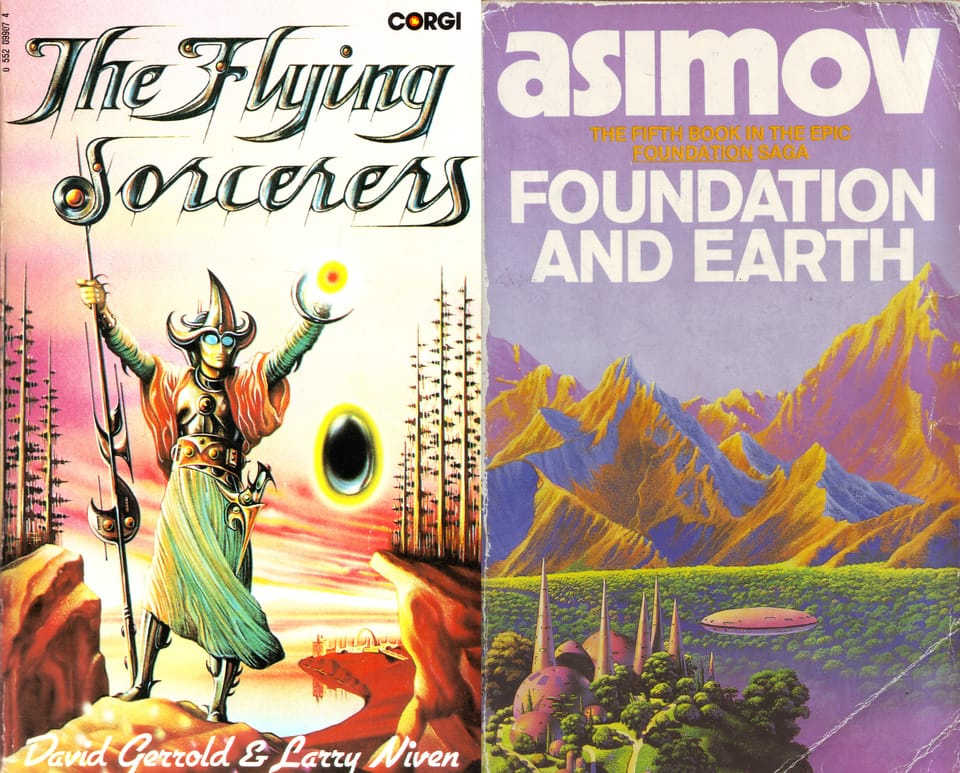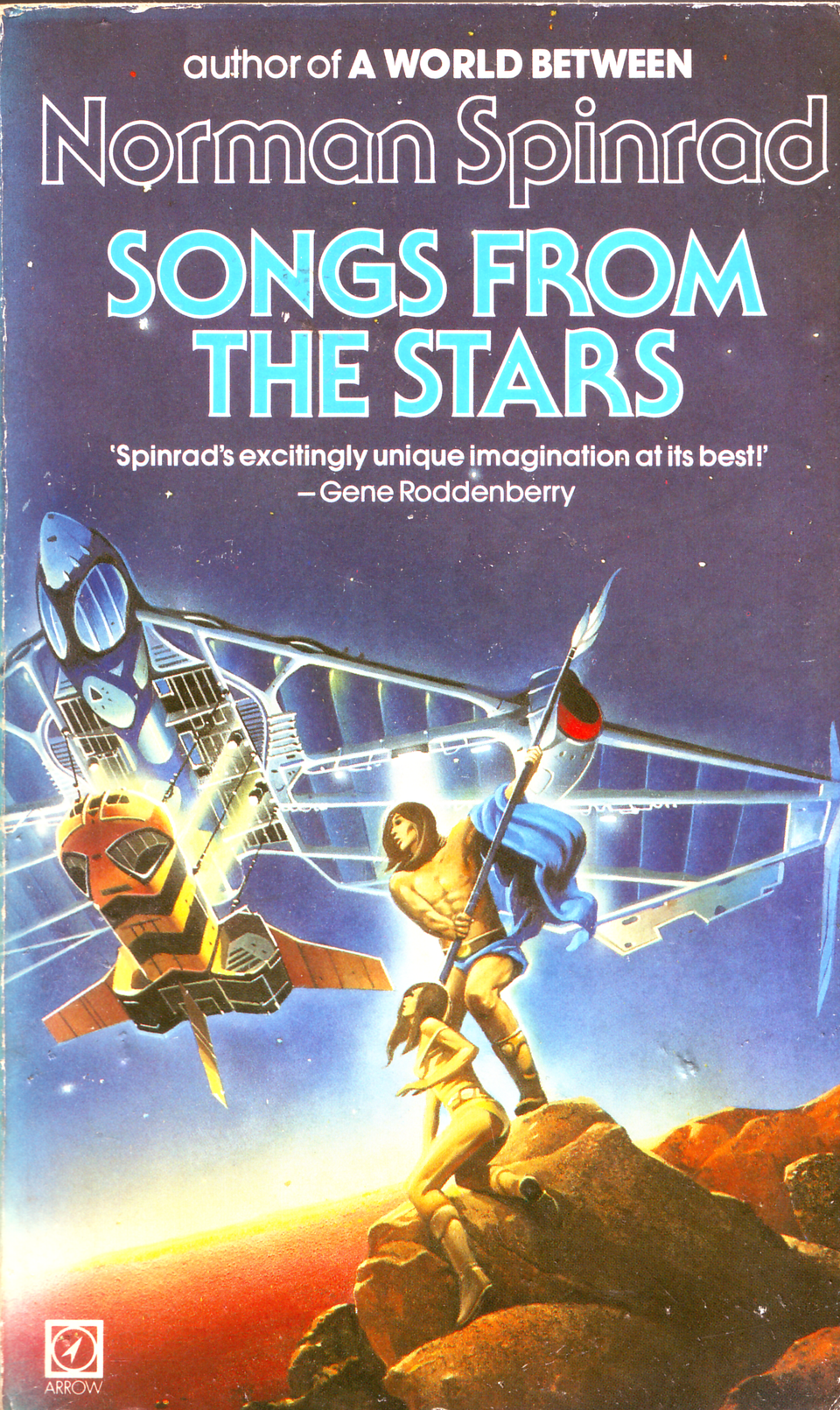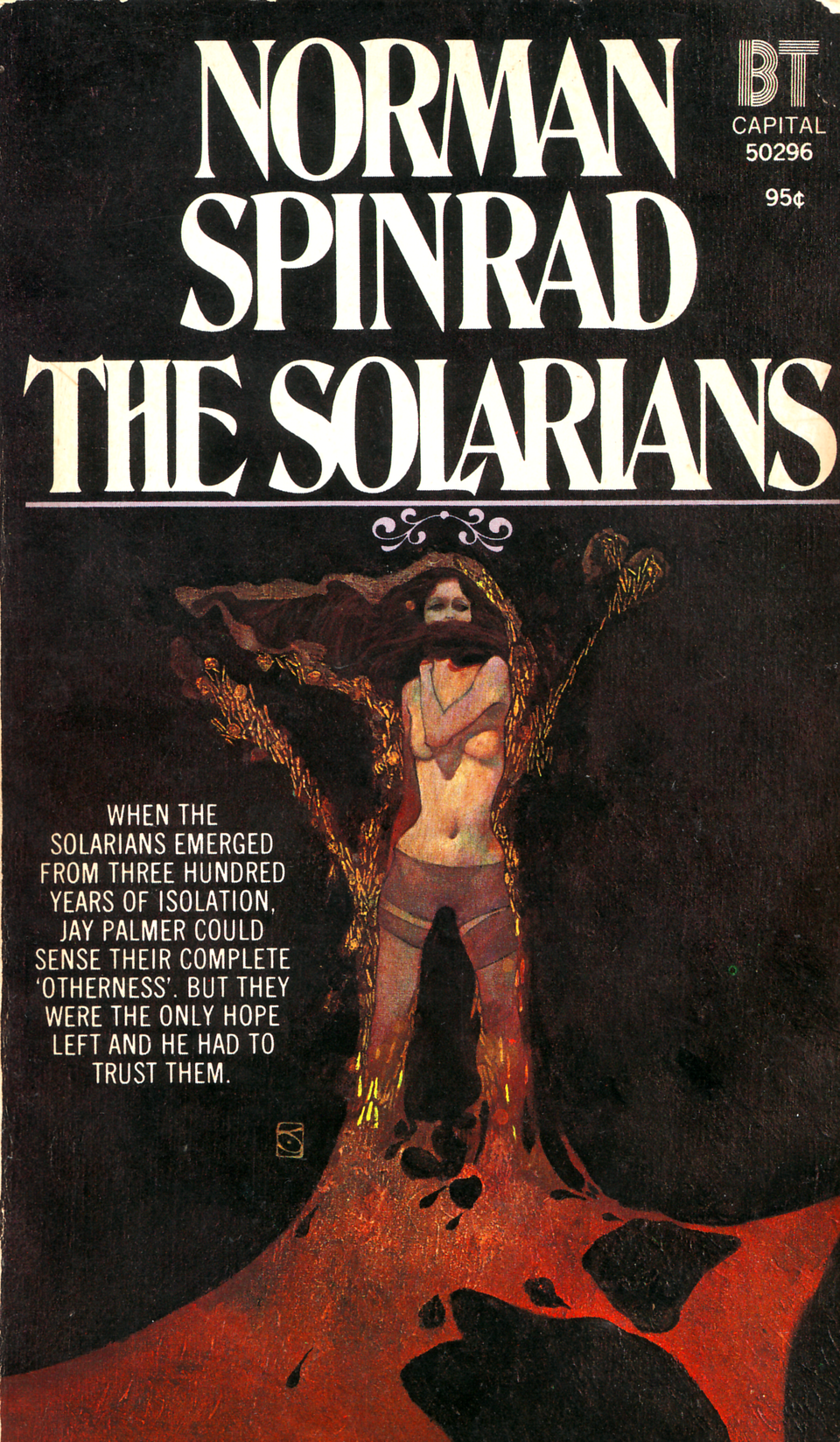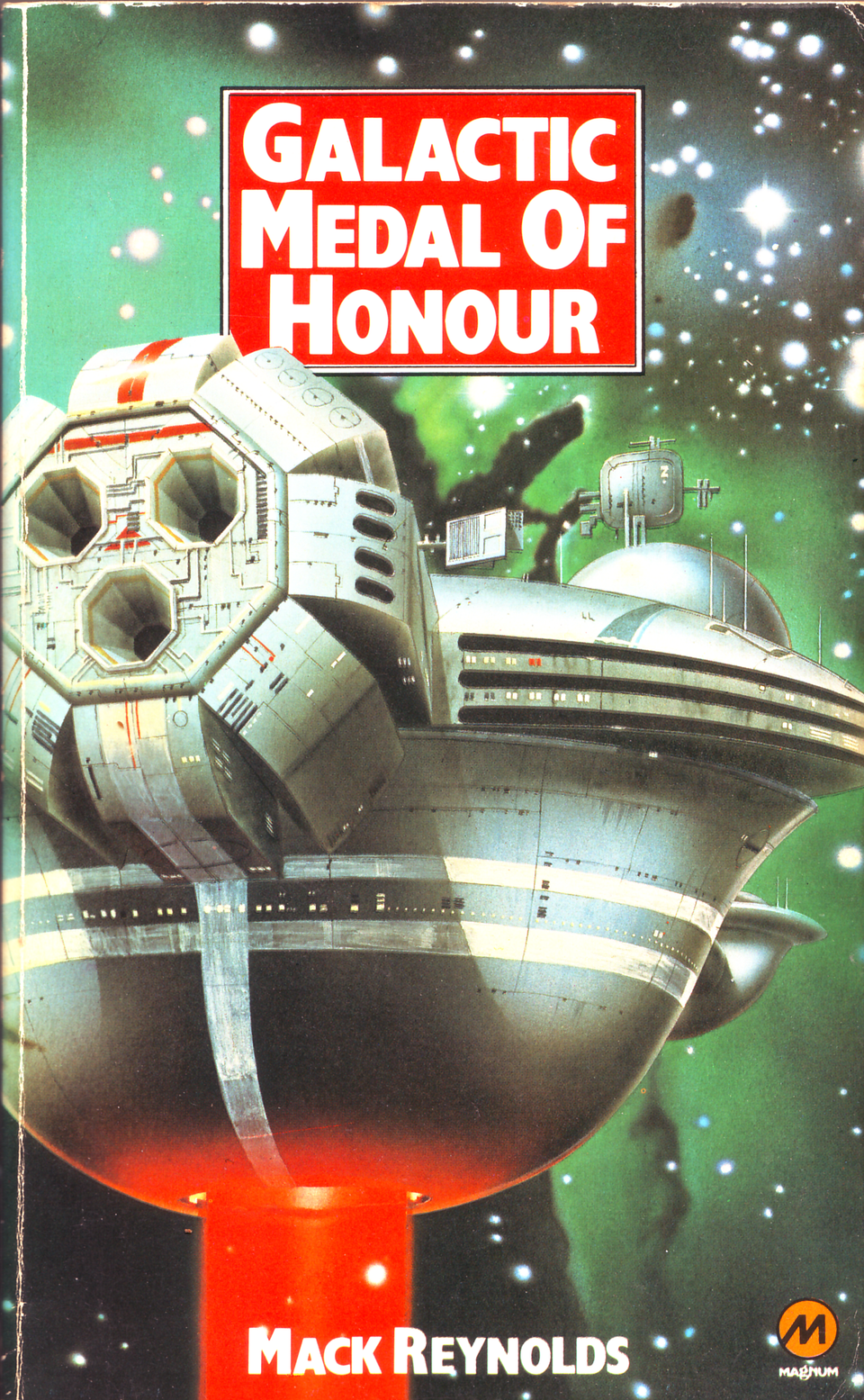Tangent Futures - WILD CARD RUN (1987) Sara Stamey
The cover didn't happen in the book at all
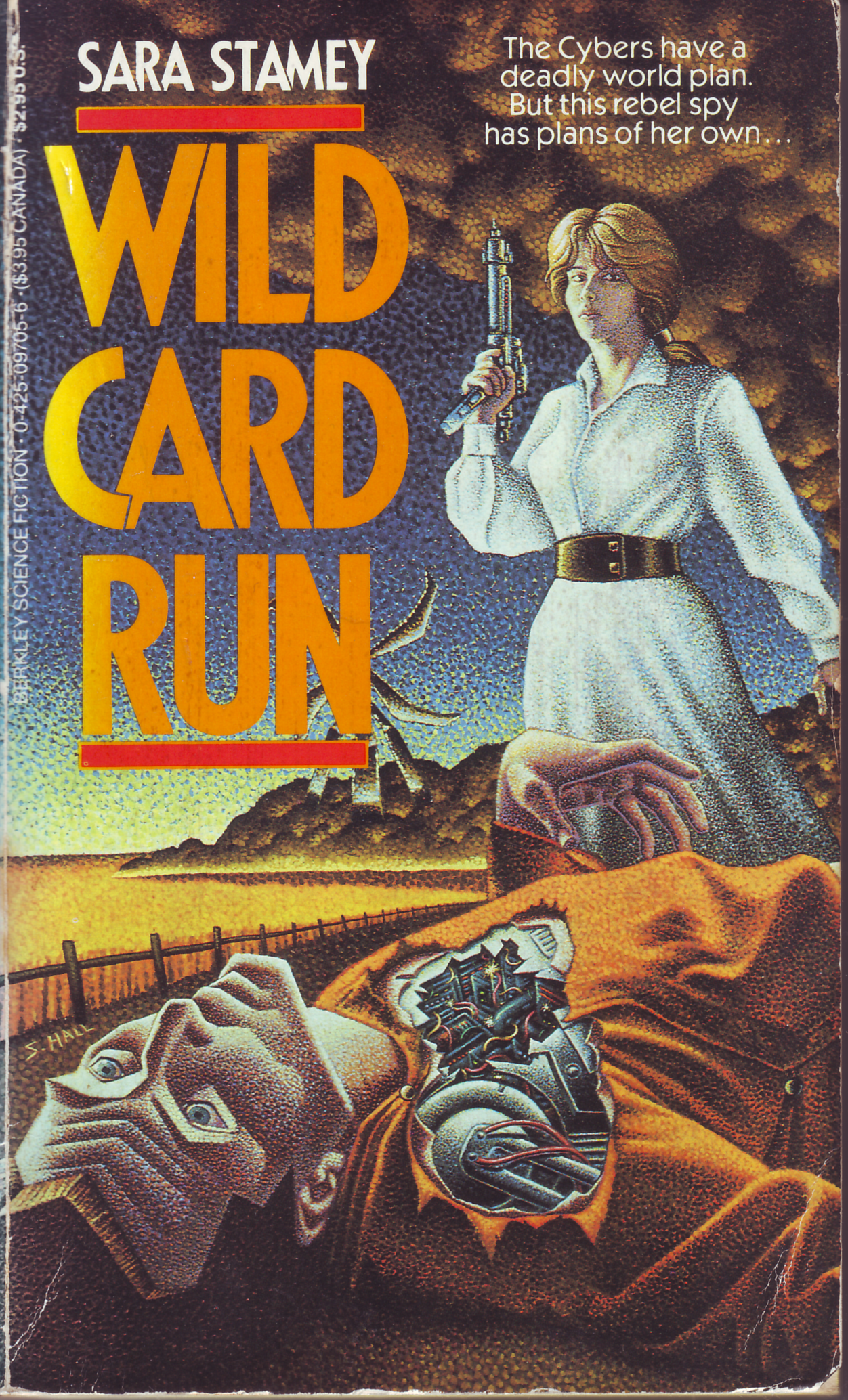
Wild Card Run (1987) Sara Stamey
In the future, humankind is spread across many solar systems. They live alongside robots, called Cyberserfs, who are ostensibly there to protect, guide and provide for the humans. Instead, it's quite a grim and overbearing relationship.
Our protagonist, Ruth.. um.. I don't think she or anyone else has a surname. They have a designation, a dystopian version of the same thing. She's independent and self assured, without being overbearingly sassy. She's at a planet called Casino, and no guesses for what that planet is like. She accepts an assignment to return to her home system of Poindram, to investigate allegations that the Cybers there have gone rogue.
Early on, a whole lot of terms and references are thrown out without any explanation. I like it when books and movies do this, its an easy way to add an exotic or fantastical air to a setting, without mundanely going around explaining what things are.
Ruth hates Cybers. To her, they're the instigators of the sterility, rule obsession and slow degradation of modern human existence. She's not wrong, really. This, she felt, was especially true on her home planet, the place she'd escaped from as soon as she could.
This is all laid out quite well. There's a prose style that takes daydreams into quite poetic territory. Metaphors are not just used, but expounded on at length. There's a good feeling for what our protagonist is not just doing, but also thinking and feeling. It's written in the first person, but Ruth is just about articulate enough internally to work with it.
When she returns to the family hearth, or farm, the way its laid out and portrayed is excellently done. Poindram, its customs, its sayings, its folksy but suspiciously Christian sounding religion, is absolutely overbearing. Her family accept her back home, save for one member, Aaron, who immediately gets on her case with a lot of biblical rhetoric. This whole character quickly feels overdone, but I get the idea.
Between the bible thumper and the saccharine, you get an immediate sense of why she left. It's a very gender codified society, women at home nurturing, men in the fields. The technology level is a sort of mix between 19th century homesteads, hearths and oil lamps, computers and electrification, with a big dividing line between them. This is apparently done on purpose, to reduce harmful influences on the families. All of this beneath the watchful benevolence of Cybers, who are more heard and not seen. They are helpers, partly, but seemingly mainly enforcers of rules.
In the background to this is Ruth's social credit, which after at threshold will mean she is "sent for healing". At this point its not explicit what this means, but it's hinted that its something between brainwashing and a memory wipe. Even asking the wrong question to a computer terminal adds to the score.
From here a mystery starts to unfold. There's a 'matron console' computer in the farm, who uses the phrase "may the fields clap their hands, may the hills feel joy together" which is such a beautifully well done line, combining the most sticky of gushing sentiment with the barest hint of total insincerity. Little stuff like that warmed me to the first half of the book immensely.
Everything has this almost temptative quality. Inviting, but like an insincere invitation, a comfort that isn't quite real. Like something offered to you by a trickster spirit, there's a feeling that engaging with it has some sort of hidden cost.
Ruth immediately, but not really deliberately, pushes the boundaries of the society. She goes into the fields, a place women shouldn't go, and climbs one of the control towers. From there, she notices things amiss. Power readings that don't add up, generators that sound wrong, that sort of thing.
After a strong start, this is where the book starts to sag. The wealth of detail and possibility early on is reduced quite sharply, to an agrarian world, with a limited number of people to engage with. It limits what maybe shouldn't have been.
The trouble is that the "something is wrong" aspect wasn't expounded upon widely enough, or revealed in large enough doses to be engaging. Ruth uncovers things one at a time, but doesn't have any agency to act on it. After a few reveals, it becomes flat and rote. The bible thumping family member quickly becomes a suspicious character, but it doesn't get followed through on. Even after he's seen to provoke an accident that nearly kills someone.
We're left hanging. Cybers, right up until the book concludes, are out of sight. They manipulate events, but they're never seen or heard directly. For such a pivot of this entire world, its missing a big opportunity. Have them in the streets, preaching, bossing people around, shouting through megaphones that the fields are clapping their hands with joy. Have them being intrusive.
Ruth then discovers old video files that should throw the plot wide open, but the reveal isn't acted upon. It's like a mystery plot in a point and click adventure game, where items of knowledge are collected compulsively, but then never acted upon or used. After this time, when the whole construct of the society is exposed, she really needs to do something. She kinda doesn't.
There was so such scope set up at first for conflict between her and her environment that just isn't used. Even the prose, its strong suit, starts to develop a hypnogogic quality that causes skim reading. There's just not enough happening to anchor it to.
Then, a hundred pages from the end, there's a big lurch and everything gets resolved. Not well, but its resolved. If these events had happened in the middle section of the book, maybe it'd have worked out better. Ruth is forced to act by a sudden revocation of her credit chip.
She goes to someone elses farm, partly to deliver some sort of gift, but mainly to advance the very sleepy plot. She meets an annoying hacker child, whose curiousity combines with a 'gee whizz batman' mode of speech that is instantly grating. Ruth finds him annoying too, but he's so good with computers that she lets it slide. The kid also recovers, or steals, a precious necklace she pawned when her chip got revoked.
It's all very clunky and awkward at this point. Oh, right, this kid can also forward the plot, by rerouting wires in one of the computer terminals. From this, we discover that yes, the robots on this planet have gone rogue. A reveal that really had too much foreshadowing to have any impact at all.
There's a scattering of good passages still. She's shown a vision of the possibilities of the 'healing' process, but works out that its a deception and has to fight her way out from it. Its well done, poetic and dreamy.
Oh, also, there's a developed but taboo love interest at this point as well, between Ruth and her mother's second or third husband. He turns out to be a robot, well, a cyborg, a human consciousness with a robot body.
At this point, I confess I've lost interest. The resolution is that the robot love interest dies saving her and Ruth and the hacker child escape off planet. It's rushed really heavily.
Ruth prevaricates through so much of this, stuck between assimilating into a society she hated enough to escape, and flagrantly defying it. She doesn't do either. An understandable reaction in real life, but not in a short novel. She needed to take a side.
The machine threat, and its threat to the society, is so vague that right until the end its almost completely reemote. It's third party, its through anomalies, weird feelings, terminal readouts, bits of information. Early on, she's explicit about how much she hates Cybers. You get the feeling that she'll get the chance to act on it, and she doesn't. When it's revealed her lover is a cyborg, her reaction should be intense and dramatic. A confirmation, finally, they're not to be trusted. Instead, she's angry for a couple of pages, and then accepts it. Surely its a deeper betrayal than that?
Like many B movies, it fails to follow up on a strong premise. The idea of a society thats so heavily socially engineered that it is part futuristic, part 19th century homestead is a good premise. There's a conspiratorial undertone to the entire book thats never really pulled out or used. It's stated and then stashed away in the knowledge inventory. Have her reveal to the whole community the deceit. Have her turn people around, even the ole' bible thumper.
Instead the family are just peeved or saddened by her actions. One thinks she's a demon. She has the information to set them all free. Do it, and even if they don't believe it and cling to the illusion, that's better than what the book did with it, which is nothing. Fight against the robots, have the computer kid do something with wires. By the time the book is in a position to act on all of this, its ran out of space to resolve it properly.
It's a book that burns off accumulated goodwill towards it, but not totally. Read the first half, and skim the second.
